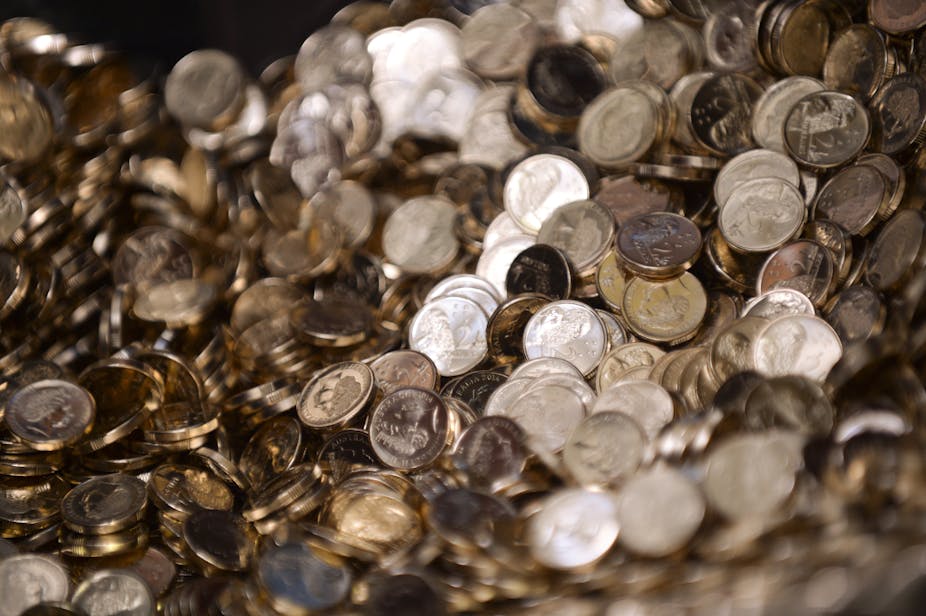The Australian dollar fell to US77.17¢ overnight on the back of strong US jobs data, hitting values not seen since the GFC in 2009.
The currency recovered slightly over the course of Friday morning, tracking at around $US77.85¢.
The fall comes in the lead-up to the Reserve Bank of Australia’s February meeting, at which some are expecting a decision to reduce the cash rate or a hint that a cut is on the cards for early 2015.
Here, our experts give their insights on what happened to the Australian dollar and why:
Mark Crosby, Associate Professor of Economics at Melbourne Business School
The Australian dollar (AUD) has been overvalued since the GFC because of quantitative easing and low rates in other advanced economies, and resultant carry-trade-type flows that pushed the currency up. While we haven’t seen much change in policy in advanced economies, the prospect of rising rates in the US has seen the AUD fall, along with weakening commodity prices and global economic growth.
An overvalued exchange rate is bad news for the economy, so the return to something near fundamental fair value, in the 70-80¢ range, is good news. Volatility is usually a problem for some businesses, so at the moment expect some companies that have not hedged against a falling Australian dollar to report some bad results. It is also of course bad news for travellers overseas, but good news for travellers to Australia and for tourism.
In short, this is mostly a good news, not a bad news, story.
Mardi Dungey, Professor and Deputy Head, School of Economics and Finance, University of Tasmania
The next months may well be a period of volatility for the Australian dollar. At the moment, the market wonders whether the RBA will follow other central banks to ease monetary policy conditions, but I think on balance this is unlikely. In my view, monetary policy in Australia is likely to remain stable - but we may well see the Australian dollar bounce around in the lead-up to the announcement next Tuesday.
While the lower Australian currency improves the prospects for many of our exporters, international conditions are unsettling the market, leading to uncertainty and hence volatility. However, we have shown in recent work that the RBA has a reputation for clear and transparent policy communication and there is no reason to expect a violent change in policy formation.
Jakob Madsen, Xiaokai Yang Professor of Business and Economics, Monash University
This is a reflection of what is going on in Europe, particularly with the massive quantitative easing there and all the tensions in the European Union.
When the currency market is uneasy, then it’s very sensitive to interest rate expectations. I would definitely not recommend a reduction in the cash rate, and I personally don’t think they (the RBA) are going to do that. But that is the expectation.
We have a lot of uncertainty in Europe and a big capital flight to the US, which is where it always goes when there is uncertainty in the market.
As far as I can see, this fall is not because of a personal attack on Australia – it’s not like there’s bad news in Australia that has triggered this. It’s phenomena elsewhere in the world that are triggering this fall.
If it was triggered by domestic problems like a weak economy or poor consumer confidence, then that would be a different story and I would be worried.
But that is not the case, so in that sense I am not too uneasy about it.
I think the Reserve Bank should under no circumstances lower interest rates. I would be in favour of even a small increase in interest rates. Although some people think the Australian dollar still overvalued, a strong fall is not good because it can harm the financial markets. And if they are unhappy, then the economy is unhappy.
Th government has to be prudent with its fiscal policy. The budget was a farce and they need to tidy it up. They need to get their house in order. They could give a clearer signal and be more realistic about the political environment they are working in.
Overall, Australia is going OK, though, there’s no serious problem at the moment. But the government needs a long-term strategy, which they don’t have.

